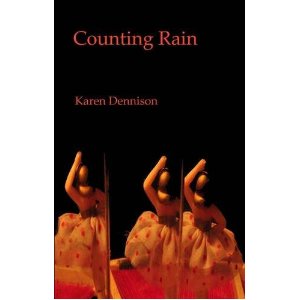Counting Rain by Karen Dennison is an interesting first collection. To me it felt like the writing of someone who is on the way to being great. The collection is carefully constructed, Dennison has clearly thought deeply about the order of the poems and the way that they relate to one another. Firstly the book moves through a logical sequence from childhood to more adult themes – relationships etc. In the latter half of the book the narrator is haunted by her past and that of her parents. But there are smaller connections at work here too. The thorns of the blackberry for example in Silhouette (p14) are echoed by the thorny rose of The Fourth Flower (p15) and the bruised legs of the grandma in 123 Corbyn Street (p16) are followed by the limbs of a doll in the following poem The Doll. There are small connections like this all the way through the book and it was pleasing to me, as a reader, to find them. This is clearly a collection that hasn’t just been thrown together. Dennison has worked hard at her craft thinking about the relationship between each poem and its neighbour as well as the wider themes of the work. The result is that the work hangs together well and ends on the rather aptly titled The Final Room.
As to the poems themselves; on the back of the book Bill Greenwell states that “disquiet and tension lie just beneath the surface.” I would have to disagree – for me disquiet and tension were the main themes of the book – almost every poem is brimming over with them. The collection is scratching at the itchy scab of an uncomfortable childhood. Things creep beneath the surface of normality that are half alluded to or hinted at giving the reader a growing sense of alienation. I recognized this uncomfortable place as it is a place that I have visited in my own early poems, and it is a place that we have been taken to by the work of other poets such as Sharon Olds and Martin Figura. But there is more direct reference to dark themes here too: allusions to abuse, dysfunctional relationships, and the collusion that dysfunctional relationships can bring with them.
The poems are spare in language and form; mostly short and making good use of the white space around them. The white space and the sparseness of the language suit the subject matter, enabling the poem to get right to the point. Poems like Recipe for Passion (p38) put me in mind of Lorca’s Poem of the Deep Song; both the lightness yet heaviness of the language and the layout and use of brackets within the poem.
You (flesh that shimmers,
skin of golden brown) scatter
the leaves and burn the season.
The ground is falling and the
sea is draining. Do they matter?
You (flesh the colour of honey,
Fragrant skin and soft) falling
To the ground, draining the sea…
If I had to pick a low point it would be Sestina . I always groan a little inside when I see a poem named after its form – it feels like either the poet is being lazy or that they feel the need to announce to the world that they can do something clever. Any poet reading the collection will recognize that this is a sestina and if they don’t does it matter? The greatest achievement in using form is when it seems so natural you hardly notice it is a form (like Heaney’s Two Lorries). That said Sestina is not a bad poem, but for me it was the least successful in the collection. I liked its echoes but the ending seemed a little clichéd, and this I am guessing, is because of having to adhere to the form.
There is a mythical/mystical quality to Dennison’s work too, an otherworldliness which stops the poems teetering over into pathos or alienating the reader completely. These, however, are not poems to make the reader feel at ease, they are full of grief, pain and loneliness, loss fear and perhaps occasionally a tiny hint of joy. There are echoes of other poets here too: Pascale Petit perhaps and Helen Ivory, but Dennison has her own themes, her own voice. The driving force of the book seems to be grief and loss – although it was unclear to me who exactly has been lost; sometimes a lover, sometimes a mother, sometimes herself or a past self, perhaps all of these and more.
I thought that for a first collection the writing was very strong, well worth reading. Dennison is a poet to watch.
Counting Rain is published by Indigo Dreams and is available here and here


It’s great to see a review here of Karen Dennison’s fine collection. Thanks. I’ve been enjoying “Counting Rain” and already given a copy as a gift (which was well received). Yes, calling a sestina “Sestina” has always made me wonder a bit too, but it seems to be part of the tradition of the form, as followed by Elizabeth Bishop and others.